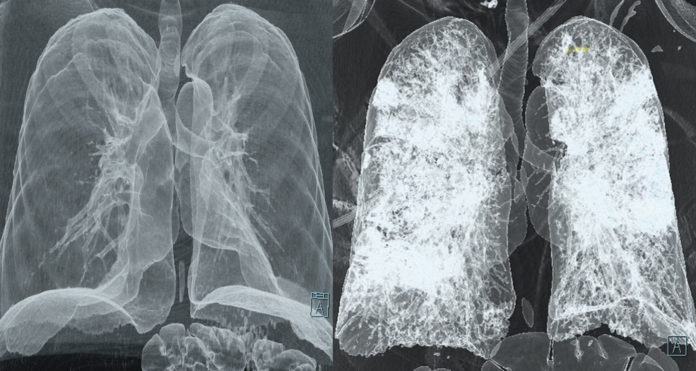A virtual treasure chest of images may help diagnose and treat patients with COVID-19.
Radiologists at Vancouver General Hospital (VGH), The University of British Columbia (UBC) and Vancouver Coastal Health Research Institute are leading an international study to better predict the presence of COVID-19 based on CT scans.
“Everyone in BC is doing what it takes to protect our families, our Elders, our health-care workers and our communities,” says Adrian Dix, Minister of Health. “I’m proud of the work that physicians and researchers in British Columbia are leading in our global fight against COVID-19.”
Radiologists, fellows, residents and UBC medical students are collecting, analyzing and labelling thousands of CT scans and in some cases chest X-rays, from COVID-19 patients around the globe, including Canada, the Middle East, South Korea, and Italy.
Information gleaned from the scans will form the basis for an open source artificial intelligence (AI) model to predict the presence, severity and complications of COVID-19 on CT scans. The model will integrate clinical data to help support and supplement existing tools to improve patient care. For example, it could help physicians determine whether individuals are best treated at home or whether they may require hospitalization/ventilation. It will not replace current testing. “The model will also assist in detecting similarities and differences in variations of patterns across different cultural and ethnic groups, and help us understand early and late stages of patterns of disease,” says Dr. Kendall Ho, VGH emergency physician and Academic Director, UBC Cloud Innovation Centre. It could also help flag those who may ultimately develop permanent lung damage/fibrosis.
“We know the lungs of COVID-19 patients are white and hazy, like a white-out or blizzard,” says Dr. Savvas Nicolaou, Director of Emergency and Trauma Radiology at VGH. “Currently, we can’t predict disease severity and its clinical impact in different patient populations. We’re confident this new tool will help us do that.” Dr. Nicolaou is leading the project with Dr. William Parker, a radiology resident at VGH/UBC.
Once developed, the new AI model will be piloted at Vancouver General Hospital with an aim to embedding it in routine diagnostic procedures to improve the accuracy of COVID-19 diagnostics. “We’ve seen patients present in the emergency department with non-typical symptoms such as severe abdominal pain, stroke and acute chest pain, and upon reviewing their CT scans for those conditions, we see the tell-tale haziness of COVID-19 in their lungs,” says Dr. Nicolaou.
Funding for this project is provided by the UBC Community Health and Wellbeing Cloud Innovation Centre (UBC CIC), powered by Amazon Web Services (AWS), as well as the AWS Diagnostic Development Initiative (DDI).
About the UBC-CIC
- Opened in January 2020, The University of British Columbia (UBC) Community Health and Wellbeing Cloud Innovation Centre (CIC)’s mission is to solve real-world challenges that materially benefit British Columbia, Canada and the world, by engaging and collaborating with stakeholders in community health and wellbeing innovation challenges
- The UBC CIC is a first-in Canada public-private partnership between The University of British Columbia (UBC) and Amazon Web Services (AWS), and one of eight currently in operation in the world
- The UBC CIC will change the way teams use cloud technology, drive innovation and improve agility and cost.
- The UBC CIC is offering technical support and providing AWS promotional credits to support this project.
About the AWS Diagnostic Development Initiative (DDI)
- The AWS Diagnostic Development Initiative (DDI) provides support for innovation in rapid and accurate patient testing for 2019 novel coronavirus (COVID-19), and other diagnostic solutions to mitigate future outbreaks.
- An initial investment of $20 million has been committed to accelerate diagnostic research, innovation, and development to speed our collective understanding and detection of COVID-19 and other innovate diagnostic solutions to mitigate future infectious disease outbreaks.
- Funding will be provided through a combination of AWS in-kind credits and technical support to assist our customers’ research teams in harnessing the full potential of the cloud to tackle this challenge.
About the research
- The Department of Emergency Radiology, Cardiothoracic Section at VGH is spearheading the research, along with VCHRI, UBC, and research lab/biotech company SapienML led by Engineer Brian Lee.
- The data collaboration is possible due to an open-source tool called SapienSecure, developed and released last year by SapienML. This free app standardizes the data de-identification of Personal Identifiable Information (PII) in medical imaging and helps to integrate directly into Amazon’s storage service, Amazon S3, in the AWS Canada (Central) Region.
- Amazon SageMaker, a service that allows researchers to deploy machine learning (ML) models quickly, is also being used by UBC AI researchers (UBC faculty and graduate students) and companies such as Element AI, Xtract.ai and SapienML to create the models that predict for the presence of COVID-19 on CT, and assess for lung disease severity leading to ICU admission, ventilation, lung fibrosis and death.


